Career Advising Program
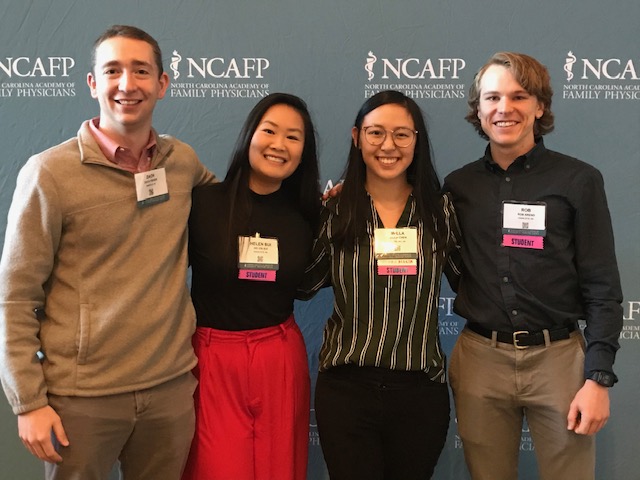
Nailah Adams Morancie, MD
Kelly Bossenbroek-Fedoriw, MD
Medical Student Education
kelly_fedoriw@med.unc.edu
Kayla Thompson, MA
Medical Student Advising
Need an ADVISING APPOINTMENT?
Download the most current ADVISING DOCUMENT
Use this great AAFP Guide, Strolling Through the Match
- North Carolina Academy of Family Physicians
- Virtual Family Medicine Interest Group: National –The Academy of Family Physicians at the national level has a great resource page for students to help with residency selection process.
- Virtual Family Medicine Interest Group: State – The North Carolina Academy has another web page that is great for students choosing careers in Family Medicine.
- AAFP Directory of Family Practice Residency Programs – Online Directory of Family Practice Residency Programs. Contains links to programs on the Web.
- Electronic Residency Application Service (ERAS) – Home page for information about the new electronic application service
- National Resident Matching Program (NRMP)
- The Family Medicine Physician Scientist Pathway Program
- National Health Service Corps Students to Service Loan Repayment Program
HRSA has opened this year’s 2021 National Health Service Corps (NHSC) Students to Service (S2S) Loan Repayment Program (LRP)
January-April of your third year
- Attend Class meeting
- Seriously considering family medicine? Schedule an initial meeting with Dawn Morriston, Director of Medical Student Advising, phone 984-974-4987 (dawn_morriston@med.unc.edu). She will review the residency interview process in light of your personal needs and issues; discuss the Kansas City meeting and assign you an MD advisor based on your needs and interests.
- Make appointments for your Medical Student Performance Evaluation with Maureen Rosen, Staff Writer in Student Affairs. Turn in your CV to Maureen if you haven’t already done so and schedule a meeting with her to review a draft of your Medical Student Performance Evaluation.
- Meet with your assigned MD Career Goal Advisor to:
- Consider whether an “audition” elective in a certain geographic area is needed/desired.
- Decide your interview months (students usually interview between November and January).
- Discuss the type of residency program you are considering
May – August of your third year
- Begin working on your Personal Statement and meet with Career Goal Advisor for feedback
- Update your CV – this will be the basis of your ERAS Application.
- Kansas City Meeting: The National Conference of Family Medicine Residents and Medical Students ( aka Kansas City Meeting) will be held virtually on July 29-July 31, 2021. Please contact Dawn Morriston at dawn_morriston@med.unc.edu if you would like to attend. Funding is available to cover your registration!
June 9, 2021
- ERAS Opens: Begin completing the application and uploading required documents.
August
- Attend the Residency Trail Info Session hosted by UNC Residency program on August 4 at 6pm via Zoom
- Consider doing a practice interview with your advisor before hitting the interview trail.
- Schedule interviews. Do not schedule your most desired program first. Rather, schedule one or two interviews to become familiar with the process
- Letters of Recommendation: following up with those who have not sent them in! Make sure that programs have received the letters, too.
- Meet with advisor to review your list of programs to be interviewed
September 29
- Have your ERAS materials completed by this deadline! Residency programs will access them and contact you for interviews quickly!
November, 2021 – January, 2022
- Interview with programs.
January before graduation
- Contact advisor to discuss program rankings
February before graduation
- Turn in Rank List to Dean’s Office
March before graduation
- If you have not matched, you will be notified by e-mail by ERAS on Monday of Match Week. They will also contact the Dean’s Office. Don’t panic. Contact Dr. Dent, your advisor and Dr. Beat Steiner, and they will work with you to identify unfilled family medicine residency programs. Unmatched students will be able to submit supplementary applications for unfilled programs.
MATCH DAY:
March 18, 2022
Kathy Barnhouse, MD

I received my MD from Wayne State University SOM in Detroit, MI and then found my way south to Charlotte where I completed my Family Medicine Residency. There I learned that I enjoy taking care of diverse patient populations both in the outpatient and inpatient settings and wanted to teach. I met my husband at a Halloween party in Charlotte during my second year of residency – we were married after I finished residency and moved to Durham so I could complete a teaching fellowship at DUMC. I was then fortunate to find a job at UNC in 2004 and have been here ever since. I wear many hats but am a clinician educator at heart. I continue to love taking care of patients and enjoy sharing that passion with learners. Just like other faculty members, I have many other jobs including mom, wife, glorified Uber driver, cook, maid, and grocery shopper. I love my job and look forward to coming to work every day but also recognize the importance of life balance. Working together and helping and learning from peers and learners who face the same challenges is key to our success. I congratulate all of you on choosing an amazing career and look forward to getting to know you.
Amir Barzin, DO
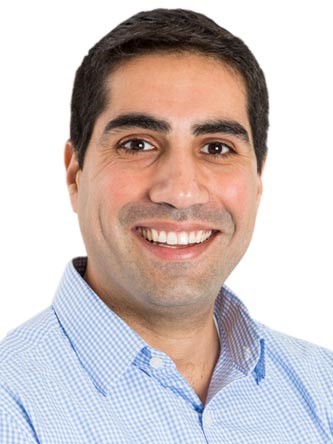
Hi! I am excited to be on this journey with you. A little about myself: I was born in Iran and came to the US when I was 4. I grew up in Texas, but came to UNC for undergrad. I then went to the Texas College of Osteopathic Medicine to complete graduate and medical school, and was lucky enough to do my residency here at UNC. After residency, I completed a chief year in which I focused on working in a variety of settings. I really enjoy my time in both the hospital and the clinic, and have served in a variety of leadership roles in both settings. Currently, I am the Medical Director of the Family Medicine Center (FMC) and the Urgent Care within the FMC. I also really enjoy the practice management aspects of being a physician. While I love my job and the wonderful people I work with, I especially love the time I spend with my photographer wife (Anna), my baby girl who was born in 2019 (Ruth), and our dog (June). We like to travel as a family, spend time wandering the triangle, and love eating our way through the world. Looking forward to getting to know you!
Kelly Bossenbroek Fedoriw, MD
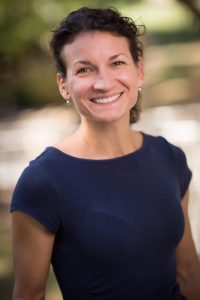
Dr. Bossenbroek Fedoriw attended the Medical College of Ohio and received her MD in 2003. She completed her Family Medicine Residency at Brown Family Medicine Residency program in Providence, RI and graduated in 2006. She is board-certified in Family Medicine. Prior to coming to UNC she worked in a Community Health Center and speaks Spanish fluently.
Dr. Bossenbroek Fedoriw is most knowledgeable about residency programs in the Midwest and Northeast areas.
Her areas of interest include: women’s health and procedures, lactation, child development, addiction, and chronic pain.
To make an appointment with Dr. Bossenbroek Fedoriw, e-mail Kelly_Bossenbroek@med.unc.edu or Kayla Bonnell@med.unc.edu.
Erik Butler, DO

When I was 14 years old, I was in a serious accident. A great doctor saved my life. The experience of being a patient inspired me to help others and become a physician. I graduated in 2004 from Chicago College of Osteopathic Medicine and completed my Family Medicine residency at Duke in 2007. After that I practiced in Pittsboro, North Carolina for 10 years before joining the faculty at UNC. As a Family Medicine physician, it is a privilege to care for patients and their families through all stages of life. The amazing students and residents who I teach and mentor are a continued source of energy and inspiration. I also love spending time laughing, listening to music, dancing, and surfing with my wife, Paula, and four children.
I look forward to guiding you as you embark on a wonderful career as a Family Medicine physician.
Martha Carlough, MD, MPH
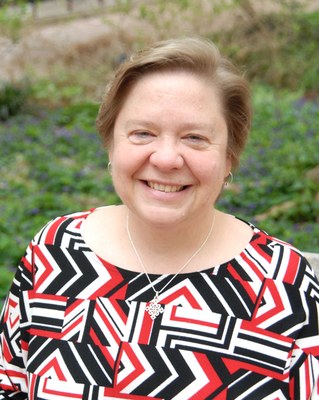
Dr. Carlough is the Director of the Office of Global Health Education at the University of North Carolina School of Medicine and Professor in the Department of Family Medicine with an adjunct appointments in the Maternal and Child Health and Public Health Leadership Departments of the UNC School of Public Health. She actively attends on the Family Medicine maternal and child health service and provides full scope outpatient care. Dr. Carlough has more than 20 years’ experience in global health and development work, including nine years in residence in Nepal where she worked both working in clinical medicine and as MCH advisor to the Ministry of Health Safe Motherhood Programme.
Catherine Coe, MD
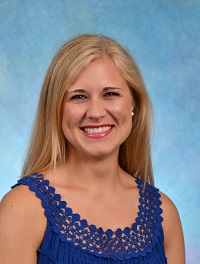
Dr. Coe is originally from Seattle, Washington and completed her undergraduate and medical school degrees at the University of Washington. She completed family medicine residency and a chief year at the University of North Carolina. She currently serves as the director of the FIRST program and is passionate about the pipeline to family medicine and medical education.
Dr. Coe was inspired to pursue family medicine after shadowing a family physician before entering medical school. She was in awe of the breadth of knowledge the provider had and the ability to change directions from caring for a newborn to an older patient. During medical school and residency, Dr. Coe was very involved in the AAFP, local academies of family physicians, as well as the FMIG.
Dr. Coe is knowledgeable about residency programs along the east and west coasts. Her personal clinical interests include caring for Spanish speaking populations, inpatient and outpatient practice, point-of-care ultrasound, and academic medicine.
To make an appointment with Dr. Coe, please email Catherine_coe@med.unc.edu or contact Kayla Bonnell@med.unc.edu.
Kelly Lacy Smith, MD

I grew up in the small town of Rustburg, Virginia outside of Lynchburg. I was the first person in my family to go to college, attending the University of Virginia and graduated with a degree in Spanish. I took time off and worked as a scribe in the UVA Emergency Department before attending the Medical College of Virginia (Virginia Commonwealth University) in Richmond for medical school. I loved all my third-year rotations and quickly realized that Family Medicine would offer me long-term relationships with my patients and I would be able to practice a variety of medicine. I completed Family Medicine residency at the University of North Carolina then stayed on for fourth-year Chief Residency Fellowship. Currently, I work within the Department of Family Medicine. I continue to practice inpatient medicine by working on the Family Medicine Inpatient Service, working on the rural Chatham hospitalist service, and working in the new Observation unit. In addition, I see patients in Family Medicine Center and on our Maternal-Child Health service. I am interested in teaching both medical students and residents; now I am part of the Patient-Centered Care (PCC) course for first- and second-year medical students. I would like to be involved in developing medical school curriculum especially around rural populations.
To make an appointment with Dr. Smith, please contact her at Kelly_Smith@med.unc.edu
Narges Farahi, MD

Dr. Farahi attended the University of Pittsburgh, School of Medicine and received her MD in 2007. She completed a Family and Community Medicine Residency at the University of California, San Francisco at San Francisco General Hospital in 2010 and is board certified in Family Medicine.
Dr. Farahi is most knowledgeable about residency programs on the West Coast and particularly Northern California.
Dr. Farahi’s areas of interest include: maternal and child health, reproductive health, care of the underserved, full-scope family medicine, and team-based care.
To make an appointment with Dr. Farahi, please contact her at narges_farahi@med.unc.edu.
Tommy Koonce, MD, MPH
 Dr. Koonce attended the UNC School of Medicine and received his MD in 1999. He completed his Family Medicine Residency at East Carolina University in Greenville, NC in 2002. He then completed a fellowship in academic medicine at UNC and earned his MPH. He is board certified in Family Medicine.
Dr. Koonce attended the UNC School of Medicine and received his MD in 1999. He completed his Family Medicine Residency at East Carolina University in Greenville, NC in 2002. He then completed a fellowship in academic medicine at UNC and earned his MPH. He is board certified in Family Medicine.
Dr. Koonce is most knowledgeable about residency programs in North Carolina and the Southeast.
Dr. Koonce’s areas of interest include: inpatient medicine, quality improvement, and medical student teaching.
To make an appointment with Dr. Koonce, please e-mail Thomas_Koonce@med.unc.edu or Amanda Harvey adharvey@email.unc.edu.
Yee Lam, MD, PhD

I’m excited to hear that you’re interested in a career in family medicine. I came to family medicine through a love of women’s health that grew into care for the whole family from birth to passing. I have a background in engineering that helps me approach patient care from a unique perspective. I take care of patients in clinic and in the hospital, and work with medical students and residents at many points during training.
In my time outside of medicine, my husband, our 2 children and I enjoy traveling, hiking and camping. We also enjoy cooking together and tasting the abundant supply of local fresh produce.
Interests: women’s health, preventive medicine, care for the underserved, health equity and healthcare reform, medical student education, academic medicine
To make an appointment with Dr. Lam, contact Kayla Bonnell@med.unc.edu.
Morgan McEachern, MD
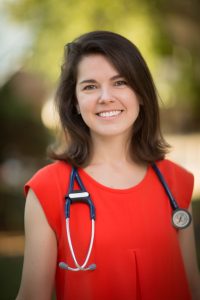 I’m originally from Phoenix, Arizona but moved to North Carolina as a teenager and over the years it has really grown to become my home. I completed both my undergraduate and medical school degrees from Wake Forest University, but took a brief hiatus between degrees to join AmeriCorps. There I worked to establish HIV/AIDS prevention educations programs with inner city youth, offered free HIV and STD screenings to a variety of high-risk populations, and provided medical and support services to patients living with HIV. This experience was incredibly formative and set me on a path of wanting to care for vulnerable populations and underserved communities. In medical school, I was quickly drawn to family medicine and the breadth and depth of care provided to entire families through the specialty. I became particularly interested in caring for women and children as a way of improving the overall health of communities. I completed my residency training and career development fellowship in Maternal Child Health here at UNC and during that time developed a passion for teaching. My clinical interests within Family Medicine include maternal and child health, women’s health and reproductive access, vulnerable populations, and social determinants of health. I continue to practice full-scope family medicine including outpatient, inpatient, and maternity care for entire families. Outside of medicine, I enjoy spending time with my partner, daughter, and dog. I also enjoy traveling, hiking, practicing yoga, and trying new restaurants.
I’m originally from Phoenix, Arizona but moved to North Carolina as a teenager and over the years it has really grown to become my home. I completed both my undergraduate and medical school degrees from Wake Forest University, but took a brief hiatus between degrees to join AmeriCorps. There I worked to establish HIV/AIDS prevention educations programs with inner city youth, offered free HIV and STD screenings to a variety of high-risk populations, and provided medical and support services to patients living with HIV. This experience was incredibly formative and set me on a path of wanting to care for vulnerable populations and underserved communities. In medical school, I was quickly drawn to family medicine and the breadth and depth of care provided to entire families through the specialty. I became particularly interested in caring for women and children as a way of improving the overall health of communities. I completed my residency training and career development fellowship in Maternal Child Health here at UNC and during that time developed a passion for teaching. My clinical interests within Family Medicine include maternal and child health, women’s health and reproductive access, vulnerable populations, and social determinants of health. I continue to practice full-scope family medicine including outpatient, inpatient, and maternity care for entire families. Outside of medicine, I enjoy spending time with my partner, daughter, and dog. I also enjoy traveling, hiking, practicing yoga, and trying new restaurants.
To make an appointment with Dr. McEachern, e-mail morgan_mceachern@med.unc.edu or Sally_Bobbitt@med.unc.edu (984) 974-4990
Anne Mounsey, MD

Dr. Mounsey attended the University of London for her undergraduate education and St. Thomas’ Hospital Medical School, receiving her MD in 1982. She did her internship year at St. Thomas’ Hospital in London and completed her Family Medicine Residency at Barnet Hospital in London in 1987. She served as a Fourth Year Family Medicine Resident at John Radcliffe Hospital in Oxford, UK in 1987-88. After completing her medical training, Dr. Mounsey worked in medical centers in Oxford, Ashington, and Birmingham, UK from 1989-1996. During that time, she spent the year of 1993-94 working at the Thomas Jefferson Institute in Charlottesville, VA and later moved to the Charlottesville area and worked at UVA Dept. of Family Medicine from 1997-2007. In August of 2007, Dr. Mounsey moved to Chapel Hill to begin work in the Dept. of Family Medicine.
Dr. Mounsey is most knowledgeable about the Virginia area residency programs, and her research interests include: evidence-based teaching, and, medical student teaching and management of chronic problems, such as headache, asthma, low back pain.
To make an appointment with Dr. Mounsey, e-mail Anne_Mounsey@med.unc.edu or Kayla Bonnell@med.unc.edu.
Asheville Program students should contact Dr. Robyn Latessa at Robyn.Latessa@mahec.net.
Charlotte Program students should contact Dr. Michele Birch at Michele.Birch@carolinashealthcare.org.
Wilmington Campus students may contact Dr. Catherine Sotir at Catherine.Sotir@seahec.net
The NRMP matches applicants and programs in favor of the students. Students get their highest ranked programs when the programs rank them highly; residency programs do not get their highest choices when students have ranked other programs higher. Given that mechanism, it follows that:
- Rank your first choice first, even if you feel your chances of matching are low.
- List seven to ten programs, even if you are confident of your top three. If your academic record is uneven, you may want to list more than ten.
- Consider having a “safety” program ranked at the bottom. Not matching is problematic, even though there are usually good programs which do not fill.
- DO NOT rank a program that you really do not want to go to. You break a legal contract if you do not attend a program you matched, and it is foolish to go where you would be unhappy. You are better off NOT matching, and going through the SOAP (Supplemental Offer and Acceptance Program) process for a spot.
Use fourth year rotations to your educational advantage! The Individualization Phase is a “choose your own adventure” that gives you more opportunities to shine while filling in gaps in your clinical education. While it might be tempting to register for the minimum number of electives you need to graduate, remember this is your last opportunity to choose from a broad range of clinical rotations and garner letters of recommendation. Your Individualization Phase experiences will be the freshest and most visible to residency programs to which you apply. Craft a 4th year that shows the kind of residency you would be attracted to and the kind of physician you seek to become. The courses you choose for blocks 1-4 are especially important because they will be reflected in your ERAS application on your transcript and MSPE.
Picking Electives: Electives can fill gaps in knowledge and skills, but can also be used to feed a passion; explore an area of specialization within primary care, such as geriatrics or substance abuse; and give you some cool experiences that can make great material for personal statements and stories you will need for residency interviews.
Browse this list of recommended elective courses: FMME Courses
Required Selectives: Use these required courses to prepare for family medicine. Here are some options to consider:
- Acting Internships: Use this time to check out NC residency programs. The programs in Greensboro, Asheville, Charlotte, Cabarrus, and Wilmington take AI students, but slots are limited. The Family Medicine AI in Chapel Hill includes inpatient, outpatient, MCH, and a week of nights so that you get a wide variety of experiences and exposure to UNC faculty. You are not expected to do more than one AI in family medicine.
- ACS/Critical care: There are so many great options like MEDI 416 ERMD 425 & 426 and many others!
- Electives: Any FMME elective is great but also check out Global Health GLBE options!
Other Tips & Suggestions: Take advantage of the time and flexibility to travel if you have that passion. Ask current 4th year students for recommendations of great electives.
